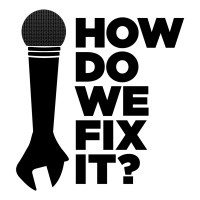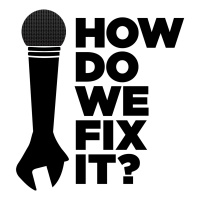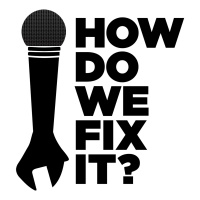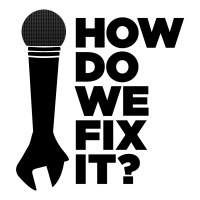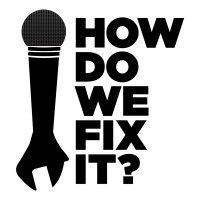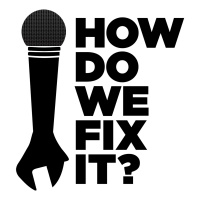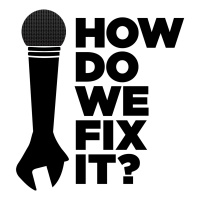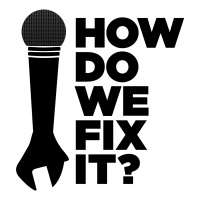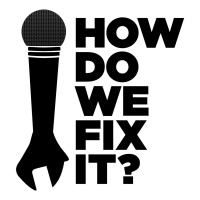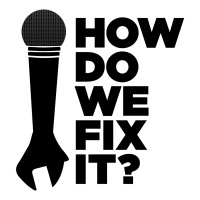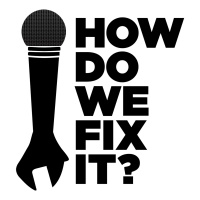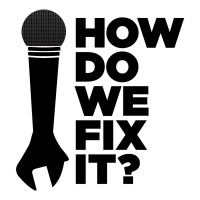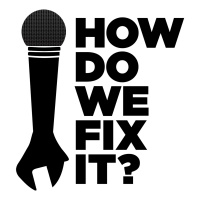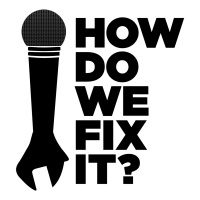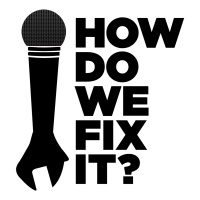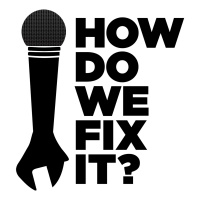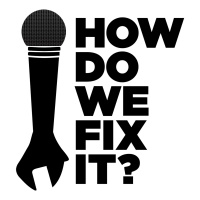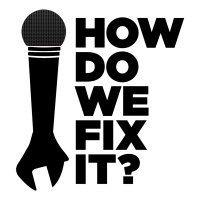How Do We Fix It?
- Autor: Vários
- Narrador: Vários
- Editor: Podcast
- Duración: 186:19:57
- Mas informaciones
Informações:
Sinopsis
From politics to the personal, we're about solutions. Our weekly podcast features two friends and longtime journalists. Join Richard Davies (ABC News) and Jim Meigs (Popular Mechanics) as they challenge authors, experts and provocateurs in a search for positive, practical ideas. Guests include Alan Dershowitz, a noted legal scholar and defender of civil liberties; Mike Rowe of "Dirty Jobs" and Lenore Skenazy, founder of "Free Range Kids." Topics include politics, parenting, personal finance, human behavior and much more. "How Do We Fix It?" - a repair manual for the real world. Produced by DaviesContent
Episodios
-
How Innovation Works and Why It Matters. Matt Ridley
19/06/2020 Duración: 28min"The Covid-19 pandemic reveals that far from living in an age of incessant technological change, we have been neglecting innovation in exactly the areas where we most need it." So writes our podcast guest, best-selling author Matt Ridley.We discuss the urgent concept raised in his latest book, "How Innovation Works, And Why It Flourishes in Freedom."As Viscount Ridley, Matt was elected to the UK House of Lords in 2013. His TED Talk, "When Ideas Have Sex" has been viewed more than two million times. His books, including, "The Rational Optimist", have sold more than one million copies.Matt Ridley argues that we need to change the way we think about innovation, to see it as a bottom-up, incremental process, rather than a top-down event that develops according to plan. He also explains the fundamental difference between innovation and invention."Trial and error is the secret sauce of innovation," Matt tells us. "Again and again and again if you talk to great innovators they stress the importance of tria
-
Racism, Protests, Police Reform: Coleman Hughes
12/06/2020 Duración: 39minThe massive wave of protests in hundreds of towns and cities across America and in many other countries were sparked by outrage, pain and grief over the killing of George Floyd, and countless incidents of racism against African-Americans.We've all been surprised by the events of the past few weeks. They've forced many of us to question our core beliefs about the political system, public morality, and the distribution of power. For this episode, we looked for someone who could talk about race from a personal, practical, and original viewpoint Our guest is writer and podcaster, Coleman Hughes, a recent graduate of Columbia University, who has testified before Congress, and written articles for The New York Times, The Wall Street Journal, Quillette, and other outlets. Coleman was recently named as a Manhattan Institute fellow."If we are just going to live in what's comfortable you might as well not think at all", says Coleman, in response to chants, demands and slogans at Black
-
Special episode: Racial Injustice: KKKrossing The Divide. Daryl Davis
05/06/2020 Duración: 34minThe nation is again facing the deep pain of racial injustice. The recent killings of George Floyd, Ahmaud Arbery, and Breonna Taylor reverberated across the country, sparking widespread protests in many cities. These cases were only the latest on a very long list of attacks and murders of African-American men and women. They resulted in public outrage, some violent incidents, and many calls for police reforms.In this special episode, we share the latest podcast of "Let's Find Common Ground," a new series of episodes with public leaders that explore points of agreement in this divided time. To gain some insight on what can be done to address discrimination and tensions between races, we speak with R&B and blues musician Daryl Davis, a black man who has spent the past 35 years on a remarkable quest of speaking with, and at times befriending, members of white supremacist groups. He has hel
-
The Long Fix. Solutions for Healthcare: Dr. Vivian Lee
29/05/2020 Duración: 30minThe coronavirus crisis has reminded everyone that major reforms are needed to fix the flaws of the U.S. healthcare system. Beyond the huge expense and vast amount of waste, the quality of care varies wildly, and millions of Americans can't get care when they need it. Physician and health care CEO Dr. Vivian Lee draws on her deep experience of the public and private sector to call for a pragmatic and sweeping set of reforms. They include ending the current fee-for-service model and improving price transparency.We discuss the findings of her new book, "The Long Fix: Solving America's Health Care Crisis with Strategies that Work for Everyone.""The silver lining of the COVID 19 is that we've seen a rapid shift to alternative ways of caring for people," says Dr. Lee. Tele-medicine and technology can help lead to better access and healthcare for everyone.Recommendations: Richard gives his thumbs up toTV series: "State of Happiness" and "Halt and Catch Fire" See acast.c
-
How Science Shapes Us. Ainissa Ramirez
21/05/2020 Duración: 25minWe look at scientists who learned to manipulate common materials such as steel, glass and silicon, and how their inventions shaped the human experience. Our guest is scientist, storyteller and science writer, Ainissa Ramirez, author of the new book, "The Alchemy of Us, How Humans and Matter Transformed One Another."We discuss the wonder of science, especially material science: What it is and why it’s a crucial part of all that is in us and around us.Ainissa shares her love of science and tells us stories of the woman who sold time, why the brevity of the telegram influenced newspapers and the writing of Ernest Hemingway, and how a woman chemist exposed the use of Polaroid cameras to track black citizens in apartheid South Africa. We also discuss the teaching of science and technology. "STEM education right now is in the business of making people who can code, says Ainissa. "I think we should be in the business of making good people."Recommendation: "The Alchemy of Us", by Ainissa
-
COVID Surprise: 7 Unexpected Changes. Jim and Richard
15/05/2020 Duración: 23minThe Coronavirus pandemic is the 21st century's biggest crisis to date: Worse than either 9/11 or the great recession. Jim and Richard discuss seven surprising things that we didn't know when the lockdowns began in March:1. Early assessments about coronavirus turned out to be wrong. We now have a much better idea of how COVID-19 is spread and who's at greatest risk.2. Re-opening the economy is going to be much more difficult than expected.3. Cars and suburbs are here to stay: how the pandemic may change the way we live and work.4. Get ready for sweeping changes in higher education.5. The need for efficient government is much greater than we imagined.6. The military will play a vital role in recovery and prevention of future pandemics.7. Our notion of citizenship and sacrifice will fundamentally change.From the economy, politics and education to the deeply uneven impacts on people in different jobs and regions, we discuss the rapidly changing nature of the pandemic and its vast disruption to our world
-
Democracy Group Special Episode. Democracy Reform
08/05/2020 Duración: 30minHow will the COVID-19 pandemic change our democracy? Will we become more less divided? We discuss the challenges and opportunities of the current crisis with four podcasters who are all our colleagues in The Democracy Group podcast network.Juleyka Lantigua-Williams, Cara Ong Whaley, Mila Atmos and Lee Drutman join Richard to talk about barriers to voting, civic engagement and equal access to the democratic system. They look at what the current crisis means for advocates of democracy reform.Juleyka is the creator and executive producer of the Peabody-nominated 70 Million, a documentary podcast about criminal justice reform.Cara is Associate Director of James Madison University's Center for Civic Engagement and co-host of "Democracy Matters".Mila is executive producer and host of the civic engagement podcast, "Future Hindsight".Lee is co-host of "Politics In Question", a podcast about how our institutions are failing us and ideas for fixing them. A senior f
-
Covid Crisis: Your Money Matters. Beverly Harzog
30/04/2020 Duración: 22minTens of millions of Americans have filed for unemployment benefits since the coronavirus outbreak began. Well over one-in-four people have suffered a moderate or severe financial setback in recent weeks. Consumer confidence is plunging. In this episode we look at the best ways to cope with a sudden drop in income. Beverly Harzog, the personal finance and credit card expert at US News and World Report, is our guest. She's the author of five bestselling personal finance books. From keeping your credit score intact to claiming all the benefits you're entitled to; we look at urgent ways to weather the storm at a time of unprecedented economic crisis. "The safest thing to do with a stimulus check is to put it in your emergency fund just in case you need it for groceries or monthly essentials," says Beverly. We also discuss debt consolidation, controlling impulse buying, and negotiating with credit card companies. Recommendation: Jim has been wa
-
How To Be a Moral Rebel: Catherine Sanderson
24/04/2020 Duración: 24minMuch of what we took for granted, including daily routines, have been upended during the coronavirus pandemic. At a time when many have new questions about our personal values, traditions and lifestyles, this could be a teachable moment.Social media may have been helpful in convincing people about the need for social distancing, wearing masks and other recent changes. "It really did allow norms to be transmitted very very quickly," says our guest, Amherst College psychology professor Catherine Sanderson.In this episode we also discuss Catherine's research into the psychology of inaction and the themes of her new book, "Why We Act. Turning Bystanders Into Moral Rebels." Why is bad behavior, from sexual harassment to political corruption frequently tolerated? Why do many of us fail to intervene when we're needed? "Moral rebels seem to be comfortable with standing up and calling out bad behavior, even if they're in a group setting in which other people are staying silent. And even when i
-
Coronavirus: Learning From Taiwan. Samson Ellis
16/04/2020 Duración: 25minEverybody is asking, how did the U.S. and most other nations get the coronavirus pandemic so wrong? Taiwan was a rare exception. Health officials and the democratic government of this island state sprang into action in the final days of 2019, and tried to warn the world of COVID danger.Despite being just 80 miles from the coast of China and with a huge amount of travel back and forth to the mainland, Taiwan was remarkably well prepared. The outbreak was kept to a minimum. "Taiwan knows that it is on its own," says our guest, Samson Ellis, Taipei Bureau Chief at Bloomberg News. "It does not have the backup of the World Health Organization or the World Bank... and that's why Taiwan backs itself up and is very cautious when it comes to issues like this."This episode looks at how technology, contract tracing, advance planning, and buy in by citizens all contributed to Taiwan's success. Taiwan's exclusion from the WHO, and a bizarre controversy over the agency's le
-
Lessons From a Natural Disaster: Jon Mooallem
10/04/2020 Duración: 30minThe great Alaskan earthquake on Good Friday, March 27th, 1964, was surprising, and the lessons from the response are helpful in understanding how we respond to the COVID pandemic today."The earthquake overwhelmed people the way the strongest emotions do," wrote our guest, Jon Mooallem recently in The New York Times. "It was pure sensation, coming on faster than the intellect's ability to register it." A big theme of Jon's new book, "This Is Chance!" is how the citizens of Anchorage almost instantly became "a wave of unofficial first responders." Despite officials' fears of panic, looting and violence, many people rose to the occasion, with countless acts of kindness. The crime rate plummeted, just as it has in recent weeks in New York.The story also includes a riveting account of the role played by local KENI radio reporter Genie Chance. The personal messages that she passed on from the local police and fire station spread vital information and helpe
-
Moving Beyond Fear. Turning Outward. Rich Harwood
02/04/2020 Duración: 27minThe coronavirus pandemic has lead many to fear, panic, anger, profound loneliness and isolation. Realizing that we are all in this crisis together, how can we cope in a more hopeful and creative way?"We need to make a fundamental choice that the only way we get through this is if we act and engage as a community together," says Rich Harwood, President and Founder of The Harwood Institute. His group teaches and coaches people in local communities to move forward by bridging divides and creating a culture of shared responsibility. "The more we step forward to take these kind of actions to reduce polarization and connect with one another, the greater sense of control we will begin to feel again over our ability to shape our lives," says Rich. The Harwood Institute was called in to help the people of Newtown, Connecticut after the mass shooting at the Sandy Hook Elementary School.The group says in its mission statement that "we bring people on the front lines of crea
-
The Future Always Surprises Us: Mark Earls
27/03/2020 Duración: 24minWhy did the U.S. and most other nations around the world do such a poor job of preparing for and reacting to the global COVID-19 pandemic? After all, we had earlier outbreaks, from HIV-AIDS to SARS, MERS, H1N1 and the Ebola virus.In his widely viewed 2015 Ted Talk, Bill Gates warned that "if anything kills more than ten million people in the next few decades, it's most likely to be a highly infectious virus." We knew about the danger, but failed to act. This episode looks at why humans are so bad at preparing for the future and how we can improve our thinking. Marketing strategist, Mark Earls, has studied behavior change for many years. He's the author of "Herd: How to Change Mass Behavior by Harnessing Our True Nature", and "Copy Copy Copy". Mark is now writing a new book, "Memories of Our Future."When we plan for what's ahead "we should consider multiple futures", says Mark. This doesn't usually happen, and "we find it much easier to have a simple story about ho
-
Coronavirus: Loving Relationships - Susan Page
20/03/2020 Duración: 28minCoronavirus has changed all of our lives. We are in the middle of a massive social experiment. This show is first in a series of episodes that will attempt to make sense of the massive psychological, social, economic and political upheaval the pandemic will have on us all.We start this week with loving relationships. Social distancing will physically separate us from friends and family members who don't live in our homes, but it will bring us closer to our spouse, partner and children. How will this challenge our loving relationships? To what extent is this crisis an opportunity to draw closer to those we love?We explore these ideas with Susan Page, a relationship and couples expert. Her Latest book is called “Why Talking Is Not Enough”. She says couples are "going to learn skills of tolerance, acceptance and adapting to each other," especially now while we are in isolation.In this episode, recorded in San Miguel de Allende, Mexico, we also look at how U.S. and Mexican societies differ in how p
-
Plastic Bag Bans: Bad for the Environment? John Tierney
12/03/2020 Duración: 28minBans on plastic bags and straws and expensive campaigns to recycle plastic waste are popular with voters. They give us a sense that the government is acting to protect the environment.Our guest, John Tierney, been a columnist for the New York Times and is a contributor to City Journal. He has been studying wastes and recycling for decades.His conclusion? “Recycling has turned out to be ruinously expensive, while achieving little or no environmental benefit."John also tells us that “if you think the biggest problem facing the planet is climate change, you shouldn’t be banning plastic grocery bags and causing greenhouse gas emissions to increase.” He argues that bans are distraction from far larger threats to oceans and rivers, such as street litter, dumping trash in the water, and poor waste controls in developing countries.Tierney’s views about the environment are controversial. He proudly calls himself a contrarian who says that just because an idea appeals to a lot of people d
-
We Need Trust More Than Ever: Jerry Michalski
05/03/2020 Duración: 24minThe rapid spread of the coronavirus COVID-19 is a reminder of the vital need for truthful information, co-operation and kindness. Rumors, hype and fear can make a growing crisis much worse than it already is. We decided to re-release an episode from 2019 on the case for trust: Why designing systems that are based on trust can improve public safety, and lead to better economic, social, psychological and educational outcomes. "We’ve internalized the assumption that humans can’t be trusted, and therefore, that we all need to be constrained and coerced into doing the right thing, pretty much all the time," wrote our guest, technology consultant, futurist and thinker Jerry Michalski.And yet, there are examples of systems designed from trust that work surprisingly well. Anyone can edit and make changes to Wikipedia pages. Most of us rely on this open-source online encyclopedia for accurate information. Micro loans go to people of very limited means, who sh
-
Sanders and Socialism: Emily Chamlee-Wright
27/02/2020 Duración: 24minBernie Sanders is the early frontrunner for the Democratic Presidential nomination. In this episode with economist Emily Chamlee-Wright, we look at why support for socialism is on the rise, and where this ideology comes from. According to recent polls of young Americans, ages 18 to 29, they are more likely to have a positive view of socialism than capitalism.Despite socialist economic failures in Venezuela, Africa and Eastern Europe, today's promises of free health care, college loan debt forgiveness, mandatory stock ownership for employees, and guaranteed income look increasingly attractive to numbers of voters in the U.S."Seriously debating socialism gets us talking about a good society really is and the philosophical, economic and political foundations that underlie it," wrote Emily in The Wall Street Journal.While believing that "competitive and open markets are the answer", Emily she tells us that the debate over socialism allows us to challenge the flawed system of crony capitalism and discuss
-
How to Open Your Mind: Jerry Taylor
20/02/2020 Duración: 27minIt's rare to meet someone who has re-thought some of his deepest convictions. In this episode, we go on a journey with one of America's leading public intellectuals, Jerry Taylor, President and Founder of the Niskanen Center, who describes himself today as a "radical moderate" who has moved away from the libertarianism of his earlier years.We focus on climate change. Jerry says he used to be a "lukewarmist", but now sees it as an urgent crisis. "The evidence for climate change as a significant, serious problem that requires really aggressive responses has become stronger and stronger over time," he says.Unlike most think tanks, the Niskanen Center (established in 2015) is not tied to any particular ideology, but prides itself in being pragmatic, and working "to advance an open society by active engagement in the war of ideas." An announcement: "How Do We Fix It?" is a member of The Democracy Group, a new network of podcasts about democracy, civic engagement, and civil discourse. Visi
-
Boosting Voter Turnout: Seth Flaxman
14/02/2020 Duración: 26minVoter turnout is much lower in the U.S. than in many other democracies around the world. In this episode, we look at an innovative initiative to use the internet to boost the number of voters in every election. "Our mission" says the non-profit group Democracy Works "is to make voting a simple, seamless experience for all Americans, so that no one misses an election." A lot of people want to vote but they forget to do it, or they don't get registered to vote. Democracy Works is a team of software developers, policy wonks and civic organizers who say they are working to upgrade the infrastructure of democracy.In this episode, we speak with the non-profit group's CEO and co-founder. Seth Flaxman. "At the end of the day, we think every American is going to want a sort of service like a concierge helping them to vote in all the election," says Seth, "even people who say they never miss elections sign up to get the reminders."This episode is funded with a grant from Solutions Journalism Network as p
-
Coronavirus: What We Need to Know. Kylie Carville
06/02/2020 Duración: 20minWith tens of thousands of cases, hundreds of deaths, and no known cure, the new coronavirus that emerged in China has been declared a public health emergency by the World Health Organization.In this episode of “How Do We Fix It?” we look at the world’s response to the rapid spread of the 2019-nCoV virus, consider the best ways to deal with the outbreak, and hear the latest about scientific research into a new vaccine.Infectious diseases epidemiologist Kylie Carville with The Peter Doherty Institute for Infection and Immunity in Melbourne, Australia, is our guest. She is on the front lines of Australia’s public health response to the virus.“I think we need to be alert, not alarmed in Australia and The United States," Kylie tells us in this exclusive interview. “Every time something happens, we learn and are better prepared for the next time.” “We will have to wait and see” if it becomes a global pandemic, she says. “We are seeing some degree of transmission out

